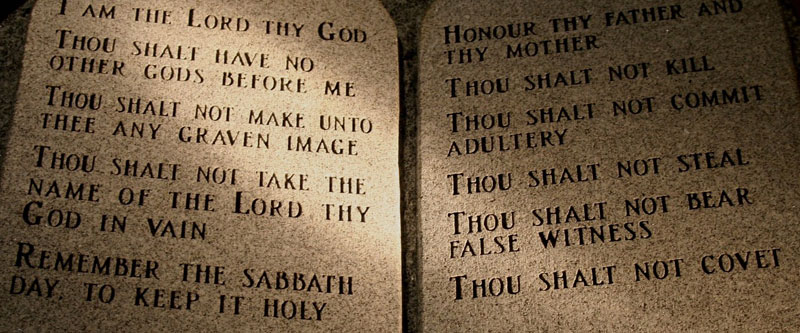When people try to provide some order in the psalms, one of the strategies they use is to identify different types of psalms, like psalms of praise or lament. When organizing them in this way, one of the categories that presents itself in the psalter is psalms of imprecation, or imprecatory psalms. In these psalms the psalmist calls down curses on his enemies. One such example is Psalm 69. The psalm opens with David asking the Lord to save him from the reproach, shame, and dishonor that fill his life. Those kinds of things might be included in a psalm of lament. And yet later David calls down curses on his enemies. He wants them to become entrapped in their own poisonous plans (v. 22), have their eyes blinded (v. 23), be overtaken by God’s wrath (v. 24), have their camps become desolate (v. 25), experience punishment without mercy (v. 27), and be blotted out of the book of the living (v. 28). Or perhaps more notoriously, Psalm 137:9 exclaims praise for those who destroy Edom: “Blessed shall he be who takes your little ones and dashes them against the rock!” These are difficult words to process for New Testament believers and sometimes cause Christians to wonder about the place of imprecation for New Testament believers.
The Tension with Imprecatory Psalms
That struggle is not without warrant since the tone of the New Testaments seems so different. Romans 12:19 says, “Beloved, never avenge yourselves, but leave it to the wrath of God, for it is written, ‘Vengeance is mine, I will repay, says the Lord.’” Or Jesus says in Matthew 5:43-44: “You have heard that it was said, ‘You shall love your neighbor and hate your enemy.’ But I say to you, Love your enemies and pray for those who persecute you.” Further, there are calls to feed your enemy when he is hungry and give him water when he is thirsty (Rom. 12:20). Further Scriptures implies that God is providing for the daily needs of your enemy (Matt. 5:45). Those apparent discrepancies lead some to conclude that Jesus and Paul are at odds with the imprecatory psalms, or even with calls of cursing of God’s enemies generally speaking.
However, to put Jesus and the psalms at odds with each other is without warrant. First, there are also calls of cursing in the New Testament. Clearly the imprecatory psalms are a fairly small category of psalms. Less than 10% of the psalms contain even an imprecatory section. In other words, it is not the main theme of the Old Testament. By way of comparison, a quick glance at the New Testament shows there are also imprecations in the writings of the apostles. For example, in Galatians 1:8 Paul calls curses down on those who would pervert the gospel, when he says, “But even if we or an angel from heaven should preach to you a gospel contrary to the one we preached to you, let him be accursed.” Or in 1 Corinthians 16:22 Paul calls curses down on those who have no love for the Lord when he says, “If anyone has no love for the Lord, let him be accursed. Our Lord come!” Additional examples are found in Galatians 5:12, 2 Timothy 4:14, and Revelation 6:10. It is a mistake to think calling down curses on God’s enemies is something that is uniquely Old Testament, and that the New Testament is filled with patience, grace, and turning the other cheek. The validity of biblical imprecation has to be understood by considering the themes of judgment and mercy together. Depending on how someone is wired they tend to dismiss one or the other, but that cannot be done from a biblical perspective.
Someone with a propensity toward justice tends to minimize statements on God’s mercy and the patience the believer is to exercise in the face of the cruelty of enemies. Someone with a propensity toward mercy will likely begin with a negative view of biblical imprecations. But in understanding the imprecations, justice and mercy must exist together without contradiction. Both exist in Scripture. They simply must be applied properly.
The justice of God, which is expressed in its final form as the ultimate curse of an eternity in hell, will certainly be applied to His enemies. However, today’s enemy may be tomorrow’s friend and vice-versa. Paul begins as a persecutor of the church, but ends an apostle. Judas Iscariot begins in Jesus’ inner circle of disciples, but becomes a betrayer of the Lord. If the church had called on Paul to be cursed while he was a persecutor, it would have been asking God to curse His apostle. And if the church had asked for Judas to be eternally blessed, they would have been asking for that blessing for the “son of destruction” (John 17:12).
Clearly, there is a use for imprecation for saints of any age, but the application of when it should be used requires discernment. Christians should be able to see that imprecation should not be used by man based on what appears to be so in his limited understanding. Instead, imprecation is applied based on what is finally true, which is only known by the omniscient God. Man’s assessment of a person’s final spiritual condition is always incomplete. Think of the worst person imaginable. Are you sure God will not pardon this guilty sinner by the sacrifice of Christ? Are you certain he will suffer eternally in hell? If not, praying a curse against him as an individual might oppose God’s will. He may be chosen by God to be an object of His mercy.
No child of God will be cursed because Christ has become a curse for him. Likewise, no enemy of God will be blessed because Christ is not his mediator. So when should imprecations be used?
Applications for Imprecatory Psalms & Prayers
The prayers of imprecation are not appropriate for individuals. Christ will certainly conquer all His enemies. However, since man does not know these enemies by name, imprecations should not be offered against an individual. It is right to pray that God would thwart a specific person’s actions, or to pray for mercy and a changed heart for those who oppose God’s church in the present. It is good to pray that God would work all his will in each person’s life, either unto salvation or condemnation. But we must be very careful not to pray a curse on a specific individual.
Prayers of imprecations are appropriate when aimed at the Devil, his demons, the wicked, the enemies of the Lord. Whoever God’s enemies are, Christians can be certain they will be defeated. Christ conquers, defeats, and judges his foes. Therefore, it is right to pray a curse on God’s enemies. That kind of prayer is simply to agree with God. The Bible states clearly that the devil and the other fallen angels are God’s enemies, and without hope of change. The wicked will be judged. The enemies of the Lord will be defeated. The Christian can pray strongly against these categories, even if, for the most part, the names of individuals are not known. God will curse and judge all His enemies as a group, and He knows perfectly well who they are individually. Therefore the Christian can leave the question of who God’s enemies are to His perfect, omniscient mind. However, since there are enemies of the Lord, curses call be called down on them without indicting any single individuals.
Agreeing with God’s Word
The curses of the Lord are real. For those outside of Christ, their eyes will be darkened with death one day. Then the indignation of God will be poured out on them, and his burning anger will overtake them. Their legacy will be nothing. There will only be the desolation and emptiness of the haunting echoes of hell. Punishment will be added to punishment for them with no hope of acquittal. They will be blotted out from the book of the living, never to be enrolled among the righteous. That is not simple an attempt to frighten. That is the words of the Bible.
The curses of the Bible allow the Christian to agree with God. It allows them to say, in agreement with the message of Scripture, that salvation is found in no other place but the person and work of Christ. There is not any other name under heaven by which men can be saved. And those who are not saved are cursed. That is God’s plan, and it is good. And those who pray and sing imprecations in that general sense are praying for and singing of things agreeable to the will of God.
Pastor Geoff Gleason
Cliffwood Presbyterian Church










